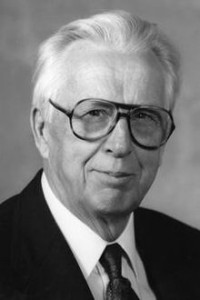 Verner Suomi was a professor at UW-Madison and is known as the “father of satellite meteorology” because of his historic role in defining that field of study.
Verner Suomi was a professor at UW-Madison and is known as the “father of satellite meteorology” because of his historic role in defining that field of study.
In the late 1950s, he and Robert Parent, a UW professor of electrical engineering, developed an instrument to measure the Earth’s heat balance from a satellite. It was the first successful satellite mission to make measurements of Earth.
In 1963, he designed the Spin-Scan Cloud Camera, a milestone in satellite instrumentation that flew throughout the 1960s, providing high-quality images of the Earth’s surface and atmosphere. These instruments laid the foundation for how to image weather for the world’s operational weather satellites.
He proposed the instrument to measure the atmosphere’s temperature and water vapor distribution from a geostationary satellite. These were measurements that became available in the 1980s.
Professor Suomi also directed the development of McIDAS, a computer software system designed to analyze and interpret the big data sets generated from satellite observations. This software, first developed in the early 1970s and maintained for over 40 years, remains a primary tool for analysis of satellite weather observations in forecasting centers and universities across the globe.
Earth wasn’t his only interest. Professor Suomi was a member of the Venus/Mercury 1973 Imaging Science Team, NASA’s Mariner/Jupiter/Saturn Imaging Science Team and the Pioneer Venus Science Steering Group.
Professor Suomi received many honors during his scientific career.
Recently, NASA named a satellite after him – the Suomi National Polar-orbiting Partnership Satellite.
Professor Suomi’s scientific accomplishments defined the young field of satellite meteorology.
His leadership in the development of satellite weather observations and analysis led to weather forecasting improvements that benefited Wisconsin, the nation and the world — the Wisconsin Idea in action.
Steve Ackerman and Jonathan Martin, professors in the UW-Madison department of atmospheric and oceanic sciences, are guests on WHA radio (970 AM) at 11:45 a.m. the last Monday of each month.

